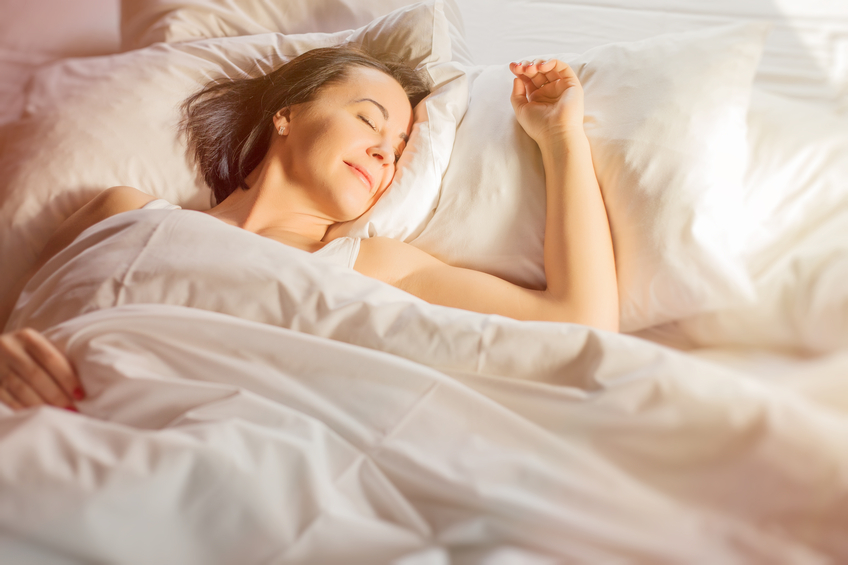It sounds too good to be true: Sleep more and you will lose weight.
But researchers have found that getting more than seven hours of sleep is linked to weight loss.[1]
The correlation between sleep and a thinner body is not as strange as it sounds. One-third of American adults are considered sleep-deprived, getting six hours or less of sleep each night. About the same percentage are obese.[2]
Researchers from King’s College in London set out to determine if improving sleep could actually help people lose weight.
They recruited 42 participants who routinely slept for less than seven hours a night. Half were encouraged to sleep an extra 90 minutes a night. And they were given sleep counseling to help achieve this.
The 21 other subjects kept to their usual sleep schedule. They were considered the control group.
All participants recorded their sleep and diet for a week. The researchers also fitted them with wrist motion sensors that measured how long they slept each night.[3]
Sweet Dreams Mean Less Sugar
The researchers found that the subjects ate less sugar after a good night’s sleep. Sleep-extended participants reduced their sugar intake by up to 10 grams a day. That’s about 2 ½ teaspoons.[4]
The control group experienced no change in sugar intake.
Reducing sugar by 2 ½ teaspoons a day would result in a weight loss of more than 4 pounds a year.[5]
The study was published recently in the American Journal of Clinical Nutrition.
Dr. Wendy Hall is a senior lecturer in the Department of Nutritional Sciences at King’s College. She was the principal investigator on the study.
“The fact that extending sleep led to a reduction in intake of free sugars suggests that a simple change in lifestyle may really help people to consume healthier diets,” she said.
Improving sleep is a great way to reduce cravings for sugar, which is linked to a medical textbook full of health conditions. Besides obesity, sugar is associated with allergies, insomnia, manic depression, high blood pressure, heart disease, diabetes, and even cancer.
Of course, for some people, getting more sleep is easier said than done. Many of us are plagued by insomnia.
As you know, we are big fans of eating organic. A study at the University of Buffalo found that organic foods can help you sleep better.
The pesticides used in conventional farming rob your body of the sleep hormone melatonin. A melatonin deficiency can directly cause insomnia.
So going organic is a double win… It helps you get more sleep. And getting more sleep helps you eat less sugar.
3 Natural Solutions for a Good Night’s Sleep
Here are three other natural remedies that can help you get the sleep you need to promote weight loss:
1.) CBD. Studies show this non-psychoactive cannabis compound eases insomnia.
A study in the Journal of Clinical Pharmacology found that CBD oil helped people with insomnia sleep significantly longer than those receiving a placebo. And their sleep was deeper than when they didn’t take CBD.
Animal research also shows that CBD improves the duration and quality of sleep. None of the studies reported any significant side effects.[6] [7]
2.)Lower carbon dioxide (CO2) intake. Researchers at Eindhoven University of Technology in Holland have found that breathing more oxygen and less carbon dioxide leads to better sleep.[8]
We breathe out CO2 naturally. So a tightly sealed bedroom can reduce oxygen and raise CO2 levels. Scientists tracked the sleeping patterns of 17 healthy volunteers over five nights. On some nights, they opened a window or a door to allow air flow. On other nights, they kept the rooms closed up.
They used sleep monitoring devices and next-day questionnaires to determine subjects’ sleep quality. They also monitored CO2 levels in the bedrooms.
Researchers found that with either a door or window open, CO2 levels fell 30%.
During the nights with lower levels of CO2, subjects enjoyed “better sleep depth, sleep efficiency, and lesser number of awakenings,” the researchers reported. They also found that opening a window is slightly more beneficial than keeping the door open. It lowered CO2 by an extra 30 ppm.
The researchers say running an air conditioner also lowers CO2.
3.) Tart cherry juice. Researchers at the School of Nutrition and Food Sciences at Louisiana State University Agricultural Center divided study subjects into two groups.
One drank eight ounces of tart cherry juice in the morning and again one to two hours before bedtime. The other group drank a cherry-flavored placebo beverage.[9]
The study found that when the subjects were on the cherry juice regimen, they increased their sleep time by an average of 84 minutes a night.
Tart cherry juice is available in frozen, canned, and concentrate forms. All contain nutrients that aid sleep. But try to find an organic version with no added sugar. They are available at health food stores and online.
If you are looking to lose a few pounds in the New Year, getting enough sleep can help you attain your weight loss goals while at the same time improving your overall health.
Editor’s Note: If you’re trying to slim down, don’t fall for the calorie cutting myth. Calories don’t drive weight gain. Something else does. And it’s easy to control. Discover more by reading The Weight-Loss-for-Life Protocol.
It’s in Independent Healing, the monthly newsletter that deciphers the latest science to bring you unbiased medical information that can transform your health. Find out more HERE.
Related Articles
Natural Diet Pill Really Works, Study Finds
6 Best Exercises for People With ‘Fat Genes’
Lose Weight by Putting Your Brain in Charge of Your Body
[1] https://www.livescience.com/61381-sleep-more-eat-better.html
[2] https://www.cdc.gov/obesity/data/adult.html
[3] https://medicalxpress.com/news/2018-01-longer-healthier-diet.html
[4] http://www.thecalculatorsite.com/articles/units/convert-teaspoons-and-grams.php
[5] http://www.myfitnesspal.com/food/calories/96109667
[6] https://ministryofhemp.com/blog/cbd-oil-for-sleep
[7] https://www.ncbi.nlm.nih.gov/pubmed/7028792
[8] https://consumer.healthday.com/sleep-disorder-information-33/misc-sleep-problems-news-626/seeking-better-sleep-here-s-one-simple-step-to-help-728763.html
[9] http://www.independent.co.uk/life-style/health-and-families/cherry-juice-sleep-help-go-bed-drink-extra-sleeping-time-study-a8028996.html

